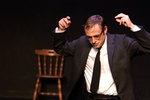 Art Scatter hereby congratulates the winners (and the nominees, for that matter) of this year’s Oregon Book Awards, especially Steve Patterson, whom we track on his Splattworks blog, for winning the drama award for his “Lost Wavelengths.” If you think doing theater is hard in the provinces, writing theater is even less rewarding, and Steve had written something like 25 plays (per his website). So, bravo Mr. Patterson. UPDATE: We recommend that you link to Mr. Mead’s pupu platter for a longer take on Mr. Patterson!
Art Scatter hereby congratulates the winners (and the nominees, for that matter) of this year’s Oregon Book Awards, especially Steve Patterson, whom we track on his Splattworks blog, for winning the drama award for his “Lost Wavelengths.” If you think doing theater is hard in the provinces, writing theater is even less rewarding, and Steve had written something like 25 plays (per his website). So, bravo Mr. Patterson. UPDATE: We recommend that you link to Mr. Mead’s pupu platter for a longer take on Mr. Patterson!
Two other items grabbed our attention in our Monday morning Oregonian. First, Marty Hughley’s unabashedly positive review of Thom Pain (based on nothing) and its star Matthew DiBiasio, which requires us to go to Beaverton to see Will Eno’s one-man rumination about, well, pain.
Second, we were happy to see that James McQuillen concurred (mostly and more learnedly) with our happiness over Tomas Svoboda’s new string quartet and much of the rest of the Third Angle show. Art Scatter needs all the validation it can get for its musical taste, so thank you for that Mr. McQuillen. On a side note, in a comment to our original post on Svoboda below, Jane Jarrett mentioned that Bill Eddins had blogged about it. Well, our report of Eddins’ performance yesterday afternoon with the Oregonian Symphony couldn’t have been more positive — a full and interesting sort of lecture-demo of Brahms’ first symphony.
